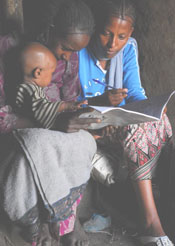7.2.1 Truthfulness and confidentiality
Two concepts that you may commonly face in your day-to-day practice are truthfulness and confidentiality. Truthfulness is about telling the truth to someone who has the right to know the truth. For example, if you have been informed about the result of an HIV test taken by someone in your community who then asks to know his/her result, you should tell the person the truth even though this might be very upsetting to that person. The concept of truthfulness urges the professional not to lie.
On the other hand, the concept of confidentiality urges you to keep a secret – by which we mean knowledge or information that a person has the right or obligation to conceal (Figure 7.4). For example, if the family of a person who has had an HIV test demands that you give them the result, you must not tell them. You must keep the result confidential unless your client gives you permission to tell their family.

The professional obligation to keep a secret arises from the fact that harm will almost certainly follow if the information is revealed. There are three types of secrets:
- Natural secret: information which, if revealed, is harmful by its nature.
- Promised secret: information that we have promised to conceal which, if broken, leads to public mistrust.
- Professional secret: knowledge which, if revealed, will harm the client, the profession and the society that obtain services from the profession. A professional secret is the most serious of all secrets, because its violation can cause the greatest harm.
Case Study 7.1 Chaltu faces a dilemma
Chaltu, a Health Extension Practitioner, is responsible for providing community healthcare for 2,500 households including Mr Gadisa’s family.
Mr Gadisa’s life is based on farming. He does not have any extra income other than the income he gets from farming. One morning Chaltu went to Mr Gadisa’s house to provide health education on family planning to W/ro Bekelech, wife of Mr. Gadisa. While she was having a conversation with her, Almaz, their sixteen-year-old daughter, interrupted the conversation and asked Chaltu to sit and discuss a private health issue with her.
Almaz began by telling Chaltu that this is a private issue and that she should not tell this to anyone, even her parents and other family members. She said, ‘I have a serious problem. Please listen to me attentively. Three months ago, when I went to fetch water for my parents from a lake which is located 3 km away from my house, I was raped by someone whom I don’t know. I saw my last menstruation three months ago. In addition I have a foul-smelling discharge from my birth canal. I regularly wash my genitals to remove the discharge, but I can’t get rid of this discharge. Now I am asking you to provide me with medicine for my problem and help me with sisterly advice.’
Chaltu sat sadly for a long period of time without giving her a response, thinking about what to do in her mind.
- a.What ethical issues do you think are raised in Case Study 7.1?
- b.Which of the following do you think that Chaltu should do? Explain your reasons.
- Option 1: Do nothing and hope that someone else deals with this problem.
- Option 2: Tell Almaz that she must immediately tell her parents what has happened to her.
- Option 3: Refer Almaz to the health centre for pregnancy testing and treatment of her infection.
- Option 4: Ask Almaz to come to see her at a place that will be confidential so that more details can be found out.
You may have raised the following issues:
- a.There are immediate ethical issues of confidentiality involved in this situation. Chaltu cannot keep these problems to herself, she has to share her concerns with the healthworkers at the health centre who will be able to treat any infection that Almaz has in her birth canal, and also check if she is pregnant from the rape. But she needs to maintain confidentiality on Almaz’s behalf and not tell her parents or anyone else about the rape that has occurred, or the problems that have followed on from the rape.
b.Option 1 is certainly not correct. As a Health Extension Practitioner Chaltu has a duty to help the people in her community. This is especially the case when their problems are difficult. You will have an opportunity to learn more details about the rights and responsibilities of Health Extension Practitioners in a future study session.
Option 2 is probably not a good idea either. Almaz needs to know that she will get support for her problems and will pick her time to tell her parents.
Option 3 is certainly essential because Almaz has problems that need to be sorted out, but which are above the competence of an Health Extension Practitioner.
Option 4 is a good idea as well. Supporting Almaz is not just a matter of referring her for help at the health centre. She will need ongoing help and needs to know that her Health Extension Practitioner is willing to offer this support in a comforting and confidential manner.
Case Study 7.1 clearly concerns the issue of confidentiality between a health practitioner and a client. It also raises a number of issues about autonomy and informed consent which you will learn about next.
7.2 Ethics in practice
